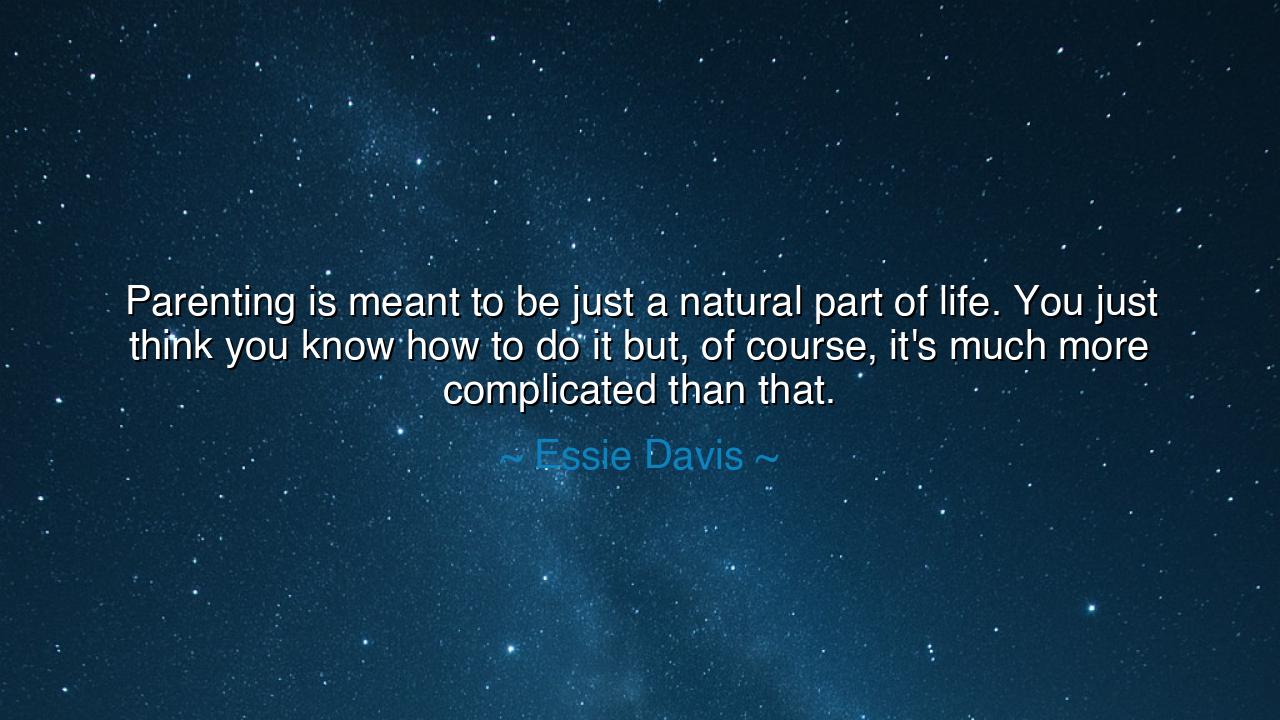
Parenting is meant to be just a natural part of life. You just
Parenting is meant to be just a natural part of life. You just think you know how to do it but, of course, it's much more complicated than that.






Hear the words of Essie Davis, spoken with honesty and humility: “Parenting is meant to be just a natural part of life. You just think you know how to do it but, of course, it’s much more complicated than that.” This is not a lament, but a revelation. For in her voice lies the truth that while the raising of children seems as ancient and universal as breathing, it is never simple, never effortless. It is a journey that deceives us at the beginning, for instinct whispers that love alone will be enough—but soon reality teaches that love must be joined with patience, wisdom, sacrifice, and resilience.
From the earliest days of humankind, parenting has been assumed as a given, woven into the fabric of life itself. The ancients did not question whether they could raise their children; they simply did, passing on what they knew of fire, of shelter, of survival. Yet even in those days, parents discovered that the task was more than instinct—it was a sacred duty, filled with trial and uncertainty. Essie Davis’ words remind us that though parenting is natural, its execution is as intricate as the weaving of a tapestry, where every thread must be chosen with care.
One need only look to the story of Odysseus and Telemachus. Odysseus, though a mighty hero, was absent for many years of his son’s life, leaving Telemachus to grow under the shadow of uncertainty. When they were finally reunited, the bond between them was not simple or automatic, but fraught with the need for understanding, forgiveness, and guidance. Here is proof from the ancient tales themselves: even heroes cannot rely solely on instinct. The work of a parent is complicated, shaped by circumstance, distance, and the delicate balance of love and discipline.
The complication that Davis speaks of is born of paradox: a parent thinks they know, yet they do not. For how can one truly know the needs of another soul, when each child is a mystery unfolding? What works for one child may fail utterly for another. What seemed clear in the mind before birth dissolves into confusion in the face of midnight cries, stubborn defiance, or hidden sorrow. Thus, the parent must learn humility, casting aside the illusion of mastery, and walking instead in the spirit of learning.
And yet, this humility is not despair, but strength. To admit that parenting is more complicated than it first appears is to open the heart to growth. It is to acknowledge that mistakes will be made, but that mistakes can be corrected. It is to understand that guidance may come from others, from experience, and even from the child themselves. For children, in their innocence and honesty, often teach their parents more than any book or lecture could. The wise parent is not the one who knows everything from the beginning, but the one who remains willing to learn.
Let us take this lesson to heart: approach parenting not with arrogance, but with reverence. Accept that it is natural, but do not mistake it for easy. When difficulties arise, do not scorn yourself, nor hide in shame, but recognize that hardship is part of the path. Seek wisdom from elders, from companions, from the very challenges you face. And above all, temper instinct with patience, so that love may be shaped into guidance, and care into strength.
Therefore, let every parent, present or future, hear these words as both warning and encouragement: parenting is life’s most natural act, yet also its most complex. Do not fear the complexity, for within it lies growth. Do not cling to the illusion of ease, for within the struggle lies the proof of your devotion. And in the end, it is not perfection that matters, but the willingness to continue learning, loving, and walking beside the child, step by step, through the mystery of life.
Thus, Essie Davis speaks not only to parents of her time, but to all ages: that the natural path is also the most challenging, and that within its challenge lies the deepest meaning of love.






AAdministratorAdministrator
Welcome, honored guests. Please leave a comment, we will respond soon